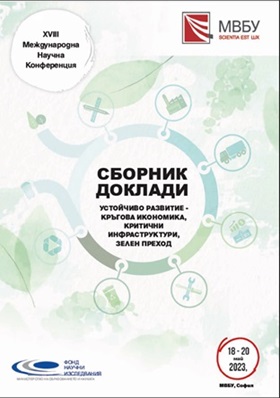Кръгова икономика за eдинно здраве – общи концептуални корени и ефективно емпирично взаимодействие за зелено бъдеще
Circular economy for one health – common conceptual roots and effective empiric interactions for a green future
Author(s): Desislava Vankova
Subject(s): Economy, National Economy, Business Economy / Management
Published by: Международно висше бизнес училище
Keywords: one health; circular economy; health promotion; quality of life; public health
Summary/Abstract: The fourth industrial revolution (4IR) era is marked by the advent of artificial intelligence and the breakdown of traditional boundaries between different spheres of life. This creates a demand for the unification of different ideas and fields, such as “One Health” (OH) and “Circular Economy” (CE). Although these may seem divergent, they share common philosophical roots and can work together to create a healthy green future, supporting sustainable development and well-being. The aim of the present report is twofold: 1) to introduce the OH paradigm and the possibilities provided by the interaction with the ideas of moving from a linear to a CE; 2) to present successful policies, pathways, and practices uniting the pursuit of a healthy life and the principles of the CE. The interrelationships between the concepts of OH and CE are analyzed from the positions of a medical doctor, a public health researcher, educator and a participant in several initiatives related to the integration of health impact assessment as a strategic goal of the CE. The distinct concepts: Every academic field has its theories and terms. In public health, OH is a planetary movement that recognizes the fundamental connection between the environment, human and animal health. In this sense, OH finds support in the holistic approaches of the CE, which are a practical opportunity to study the integrated influence of all environmental factors on health. Resilient collaborations: The World Health Organization has been supporting research in the scientific field of "circular economy and health" for decades. There is empirical evidence to support the success of European models that link health and ecology. Conclusions: The potential of intersectoral collaborations to promote health and build a green future is undeniable. This need is recognized in the field of public health and at the national level. In the 4IR era, swift action is necessary to ensure that overall societal development does not lag behind EU member states.
Book: Устойчиво развитие - Кръгова икономика, Критични инфраструктури, Зелен преход
- Page Range: 102-115
- Page Count: 14
- Publication Year: 2023
- Language: Bulgarian
- Content File-PDF

